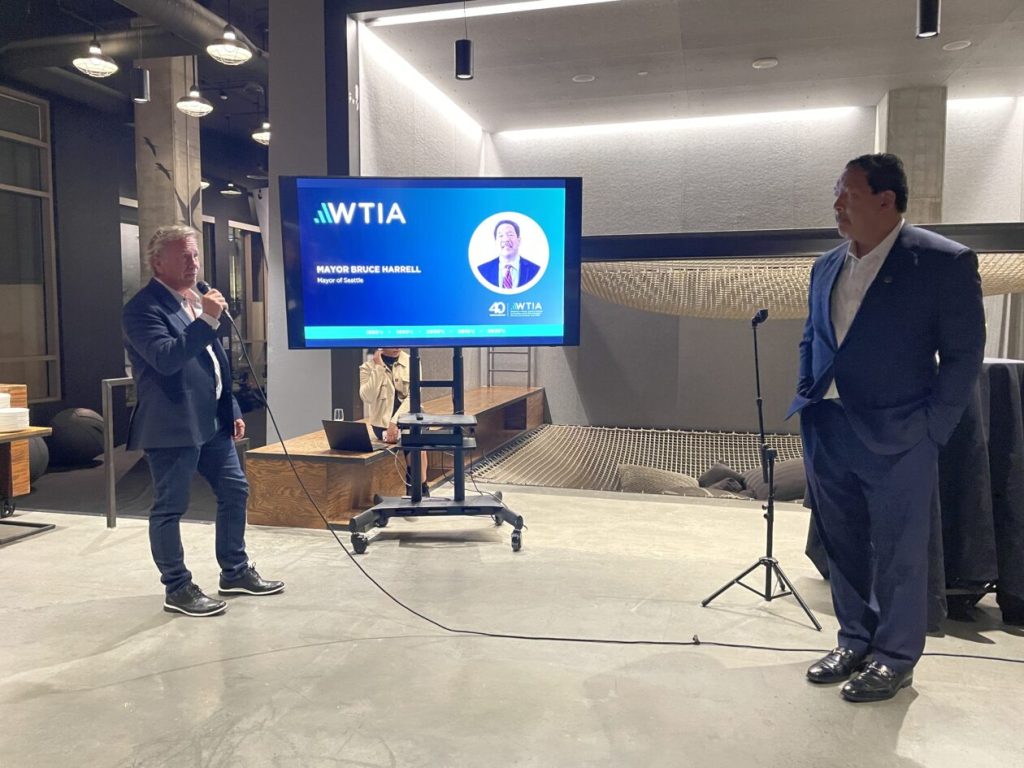Summarize this content to 2000 words in 6 paragraphs
WTIA CEO Michael Schutzler (left), and Seattle Mayor Bruce Harrell speak at the WTIA’s 40th anniversary event on Tuesday in Seattle. Schutzler is retiring after leading the nonprofit trade association for 11 years. (GeekWire Photos / Taylor Soper)
The tech scene in Washington looked quite different than today when the Washington Technology Industry Association launched back in 1984.
There was a fast-growing company called Microsoft in Bellevue, and a few other Seattle software upstarts such as AttachMate and WRQ were getting off the ground.
The industry was small and nascent. But a group of folks recognized the potential of a new, booming sector — one that needed support to grow.
The Washington Software Association, which later became the WTIA, was born.
“They sought to unite the industry. They sought to grow the industry,” Ed Lazowska, a longtime computer science professor at the University of Washington, said at the WTIA’s 40th anniversary event on Tuesday. “They sought to convince civic leaders and the citizens that … we could become a national, global power in software. That was their vision, and it worked out pretty well.”
Microsoft has grown into the third-most valuable company in the world. Amazon became the state’s largest employer as it pioneered online retail and cloud computing.
A flurry of other companies, working in software and other tech-enabled industries — Tableau, Zillow Group, F5, Expedia Group, just to name a few — sprouted in Washington and grew into major players.
The tech industry now represents about 21% of Washington state’s GDP and has created about 3.5 million jobs in total, according to the WTIA, which has remained a key pillar of the state’s innovation ecosystem.
WTIA operates a nonprofit member trade association and a for-profit corporation providing business services. It also offers health insurance and 401(k) to tech companies and entrepreneurs.
The organization will have a new leader at the start of next year, as longtime WTIA CEO Michael Schutzler announced this week that he’s retiring.
When he took over in 2013, Schutzler helped lead a shift to focus on accelerating workforce development and startup success in the region by way of public policy efforts and programs for companies and entrepreneurs.
“We pivoted it to a mission-driven organization, instead of a member-driven organization,” Schutlzer said at the event Tuesday. “It was a huge difference.”
Under Schutzler’s leadership, WTIA also helped raise $50 million for computer science education in the state of Washington, and supported more than 150 entrepreneurs who launched companies.
It also created a nonprofit tech apprenticeship program called Apprenti that was spun out and now operates in multiple U.S. states.
Schutzler thanked the hundreds of volunteers and sponsors for their support, many of whom were in the room on Tuesday.
“It’s been an amazing ride,” he said.
Kelly Fukai will become WTIA’s CEO in January.
Kelly Fukai, WTIA’s current COO, will take over as CEO.
Speaking at the event, Fukai called technology the “economic engine that powers our state.” She is focused on helping close the tech talent gap and making sure the industry benefits communities across the entire state of Washington.
“I’m really excited to take this great foundation that has been laid by our team here and all of you in this room, and really deliver at the highest level possible — and just put it on steroids,” Fukai said.
Seattle Mayor Bruce Harrell also spoke at the event Tuesday. He said his peers around the world know Seattle as a city of technology and innovation — and credited the WTIA for boosting that brand.
“I will guarantee you there are mayors that would love to have this kind of presence in their city,” Harrell said.
Lazowska reminded the audience that the WTIA’s impact is not just about tech companies and employees.
“We understand our responsibility to help create a region where everyone can not just survive, but thrive,” he said. “We’re not just about ourselves. That’s really important. We’re about equity, we’re about advancing the well-being of the community in which we live and work.”
Related: Seattle mayor, who sits on a federal AI panel, says he’ll seek ways to work with Trump administration


